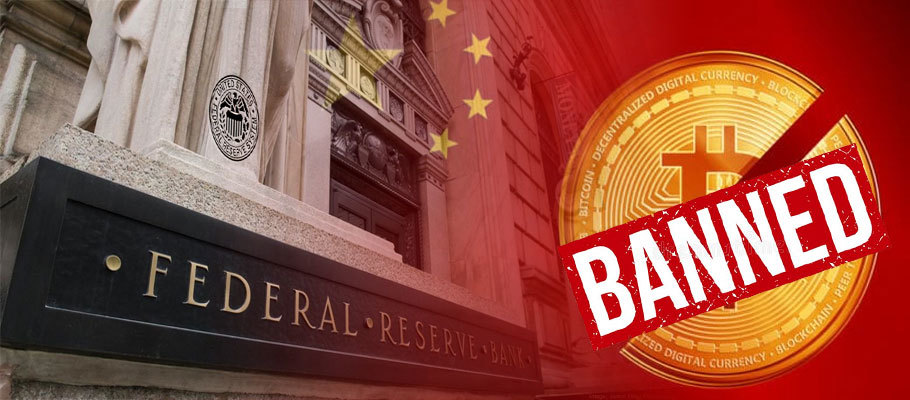
Published: October 5th, 2021
Federal Reserve Chair Jerome Powell told at a congressional hearing last Thursday that the Fed has ‘no intention’ of following in China’s footsteps and issuing a ban on cryptocurrencies in the US.
He made the statement in a submission to the House Committee on Financial Services, which is examining the Fed’s and Treasury Department’s response to the COVID pandemic.
When asked if the Fed is likely to ban or limit the use of cryptocurrencies as China has done (and reiterated with new measures last week), America’s top monetary regulator said no.
In July, Powell said that the creation of a digital dollar might someday make stablecoins redundant, but he clarified that he had been referring to stablecoins only, not all cryptocurrencies.
‘There’s been no discussion about banning them,’ he said. ‘You can think of stablecoins like bank deposits or money market funds, but at the moment, they operate mainly outside of regulatory remits. We believe it's right that they be regulated. If the financial activity is the same, it should fall under the same rules.’
Stablecoins like USDC and Tether (USDT) were created to hold a one-to-one value against a fiat currency like the dollar. The congressional hearing pressed Powell on the topic because he’s raised concerns about Tether previously, noting that, contrary to company claims, USDT isn't fully backed by American dollars but rather by a mix of greenbacks, commercial paper debts, and other assets.
'In the main, stablecoins give an impression of being quite liquid,’ Powell said in a previous shearing. But when a crisis lands, ‘markets can evaporate quickly, and that's when people start demanding to cash out.’
By applying financial rules, Powell says consumers can be confident that they’ll be able to access their money in the case of a financial crunch. Those views have been echoed by pro-Bitcoin Senator Cynthia Lummis (R-WY), who said last week in a statement that stablecoins ‘might need to be issued by depository institutions in the future. 'To protect consumers, they must be fully audited on a regular basis and backed by cash or cash equivalents.’
Powell and Treasury Secretary Janet Yellen have been working on a draft of proposed stablecoin regulations planned for release before the end of October. The proposed new rules aren’t expected to address other types of cryptocurrencies, amongst them popular-but-volatile assets like Bitcoin and Ethereum.
In China, the central bank hasn’t felt the need to moderate its anti-crypto stance, intensifying its efforts to curtail non-state digital assets. At the same time, experiments with its own ‘digital yuan’ central bank digital currency roll forward.
Last week, Beijing doubled down on its cryptocurrencies ban, declaring (again) that crypto transactions in China are illegal. It also blocked access to crypto market data services CoinGecko, TradingView, and CoinMarketCap, which traders and crypto market watchers use to monitor market trends.
While some had speculated that pressure from Beijing had compelled the services to proactively blank web sessions emanating from Chinese IP addresses, the domains of all three data services appear to be blocked behind the so-called ‘Great Firewall of China,’ a DNS-based barrier between the outside world and China’s national internet infrastructure.
China’s decision to kill off access to crypto market data arrived as part of a series of sweeping measures last week, including the new announcement that cryptos are not legal tender in China. Crypto trading, and in fact, all transactions involving cryptocurrencies, are now illegal.
For clarity, the People’s Bank of China (PBoC) published a list of banned crypto activities on Wednesday. They included issuing tokens or trading in cryptocurrencies. Overseas crypto trading exchanges were also prohibited from delivering services to mainland China-based users.
Global exchanges Binance and Huobi Global stopped accepting new sign-ups from Chinese IP addresses within hours of the announcements.
Beijing’s campaign to eliminate crypto in China dealt another hammer blow to the country’s domestic mining industry.
Sparkpool, based in Shanghai and previously one of the largest ethereum mining pools globally, announced at mid-week that it had shuttered all domestic and international activities.
Alibaba, the Chinese e-commerce alternative to Amazon, also fell into line quickly, saying sales of specialised ASIC crypto mining computers would be deleted from the site’s listings.
Using forceful language that added important detail to previous announcements, Beijing said it would locate any rogue miners still operating inside China’s borders and bring an end to crypto transactions. Huobi ceased accepting new Chinese user registrations within hours and announced that existing China-based user accounts would be ‘retired’ by the end of December.
KPMG’s cryptocurrencies division told Reuters that the announcement added to previous pronouncements from the PBoC, and eliminated any grey areas in terms of what it would and would not tolerate in the digital asset space.
The People’s Bank of China issued a joint declaration with nine none other institutions, including supreme court, police, internet monitoring agency, and state financial services regulators, making it clear that that enforcement of the crypto ban will be compressive and involve multiple government departments.
The statement also removed a lingering loophole in the rules that allowed China-based crypto traders to continue trading through offshore exchanges like Binance.
Authorities took the further step of saying that stablecoins like USDC aren’t legal tender either, a nod to the fiat-like role stablecoins can play in crypto trading. Beijing regulators are watching keeping a close eye on stablecoin activity, even if it doesn’t impact yuan exchange rates directly.
To root our mining operations defying the previous ban, China has directed local officials to look for instances of abnormal power usage and repeal any tax rules that could benefit miners, all to put the final nail in the coffin for the country’s once world-leading mining sector.
China once drove almost half of the global bitcoin hash rate, a measure of the total computing power used to verify BTC transactions.